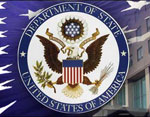 AFP: The United States is ramping up efforts to help anti-government activists in Iran skirt the government’s mobile telephone and Internet surveillance and censorship, a top US official said Wednesday.
AFP: The United States is ramping up efforts to help anti-government activists in Iran skirt the government’s mobile telephone and Internet surveillance and censorship, a top US official said Wednesday.
 WASHINGTON, May 11, 2011 (AFP) – The United States is ramping up efforts to help anti-government activists in Iran skirt the government’s mobile telephone and Internet surveillance and censorship, a top US official said Wednesday.
WASHINGTON, May 11, 2011 (AFP) – The United States is ramping up efforts to help anti-government activists in Iran skirt the government’s mobile telephone and Internet surveillance and censorship, a top US official said Wednesday.
“We’re going to do that quickly, and it’s in part to counter Iran’s increasingly active Internet surveillance and censorship,” said Assistant Secretary of State for Democracy, Human Rights, and Labor Michael Posner.
“We’re supporting grants that will counter censorship technologies, increase circumvention tools in Farsi, secure mobile communications and protect online activists against cyber attacks,” he told a key Senate panel.
Posner said the United States had spent $22 million in the last 18 months and planned to spend another $28 million in the coming months on “Internet freedom programming” and to help activists duck the authorities online.
“We’ve now trained 5,000 activists worldwide, including Iranians, in cyber self-defense,” he told senators at a hearing on democratic reforms and human rights in Iran.
“And we plan to expand all of these efforts to teach democratic activists, journalists, bloggers, human rights defenders and others how to protect their online privacy and their data, so that they in turn can train others,” he said.
The US government has funded efforts to help activists in Arab and other countries gain access to technology that circumvents government firewalls, secures telephone text and voice messages, and prevents attacks on websites.
Posner said in early April that a session held in the Middle East about six weeks ago gathered activists from Tunisia, Egypt, Syria and Lebanon who returned to their countries with the aim of training their colleagues there.
State Department officials said in April that one of the new technologies under development is the “panic button,” which allows activists to erase contact lists on their cell phones if they are arrested.
“These are tools, but they’re important tools and they’re an important part of our overall effort to try to keep pressure on the Iranian government and to make sure that people in Iran know that we haven’t forgotten about them,” Posner said Wednesday.


